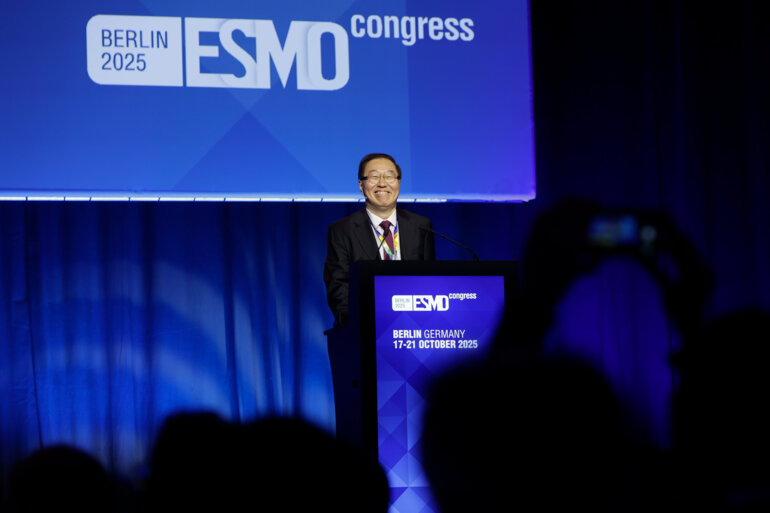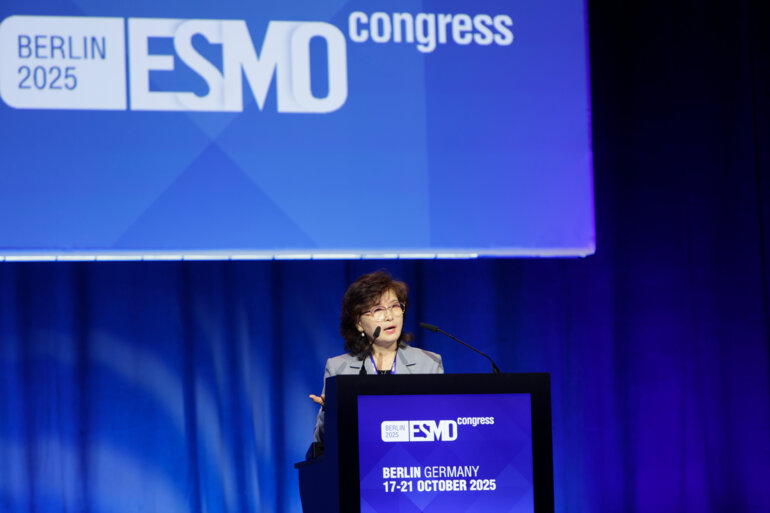High rates of adverse events in the experimental setting seem to limit the potential of antibody–drug conjugates for patients with NSCLC
The clinical benefit of antibody–drug conjugates (ADCs) in pre-treated non-small cell lung cancer (NSCLC) has so far been less dramatic than expected and toxicity management represents a major challenge as novel data from studies presented at the European Lung Cancer Congress 2024 (Prague, Czech Republic, 20–23 March) suggest.
In a subgroup analysis of the phase III TROPION-Lung01 trial with the TROP-2-directed datopotamab deruxtecan, which showed improved progression-free survival (PFS) at the ESMO Congress 2023, patients with non-squamous NSCLC treated with the ADC showed a median PFS of 5.5 months compared with 3.6 months for docetaxel (hazard ratio 0.63; 95% confidence interval 0.51–0.79) (Abstract 59P). Interim median overall survival in non-squamous NSCLC was 13.4 months with datopotamab deruxtecan and 11.4 months with docetaxel.
“These results, which show favourable efficacy signals with non-squamous histology, will play an important part in helping to direct datopotamab deruxtecan to the patients who are most likely to benefit,” says Prof. Jarushka Naidoo from Beaumont Hospital, RCSI University of Health Sciences, Dublin, Ireland and the Sidney Kimmel Comprehensive Cancer Center at Johns Hopkins University, Baltimore, MD, USA, highlighting the need to identify where these agents fit best therapeutically. “However, while grade ≥3 treatment-related adverse events (AEs) occurred less frequently with datopotamab deruxtecan than with docetaxel in TROPION-Lung01, a rate of 22% is still high in a pre-treated NSCLC setting within a clinical trial,” comments Naidoo.
Similar concerns were raised based on updated safety results presented at ELCC 2024 from the phase II HERTHENA-Lung01 trial (J Clin Oncol. 2023;41:5363–5375), involving the HER3-targeted patritumab deruxtecan in patients with previously treated advanced EGFR-mutated NSCLC (Abstract 11P). With an additional 6 months of follow-up, 65.3% of patients had grade ≥3 treatment-emergent AEs, mainly haematological, and 6.2% patients had treatment-related interstitial lung disease. “This a third-line, pre-treated population, so tolerability is very important and yet nearly two-thirds of patients had at least grade 3 AEs,” says Naidoo.
Since AEs associated with ADCs are generally higher than one might expect from a targeted therapy approach, Naidoo thinks that more time is needed to reflect on how to progress further in this area of research. “After the approval of the first ADC for the treatment of HER2-mutated NSCLC in 2023 – trastuzumab deruxtecan – the development of ADCs in this setting has reached an inflexion point and their application appears to be narrower than that initially anticipated,” she remarks, concluding, “These agents still represent a promising strategy for patients with NSCLC who fail standard therapies. However, defining which patients are more likely to benefit from ADCs may help to balance toxicity.”
Abstracts discussed:
Girard N, et al. Datopotamab deruxtecan (Dato-DXd) in patients with previously treated advanced non-small cell lung cancer (NSCLC): Nonsquamous (NSQ) histology in the phase III TROPION-Lung01 trial. European Lung Cancer Congress 2024, Abstract 59P
Poster Display Session, 22.03.2024, h. 12:00 – 12:45, Congress Hall Foyer
Hayashi H, et al. Patritumab deruxtecan (HER3-DXd) in previously treated patients (pts) with advanced EGFR-mutated (EGFRm) NSCLC: Updated safety results from HERTHENA-Lung01. European Lung Cancer Congress 2024, Abstract 11P
Poster Display Session, 22.03.2024, h. 12:00 – 12:45, Congress Hall Foyer
ADCs: The new promising therapy?
Educational Session, 23.03.2024, h. 10:00 – 11:30, Forum Hall






